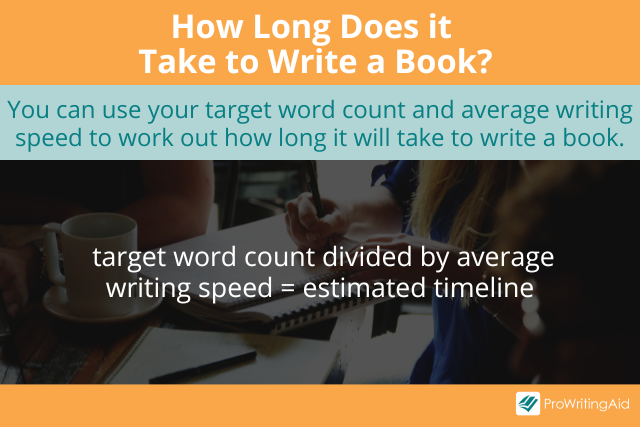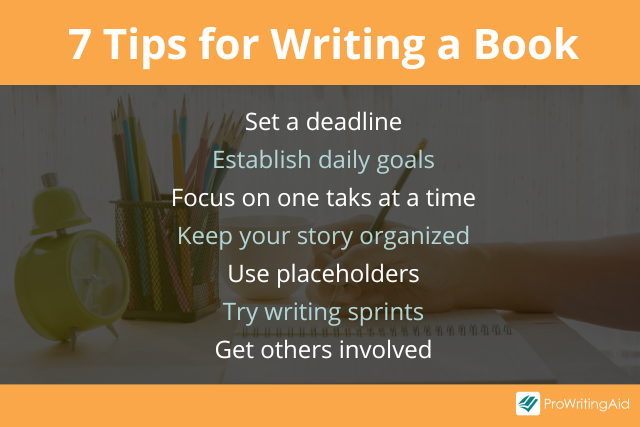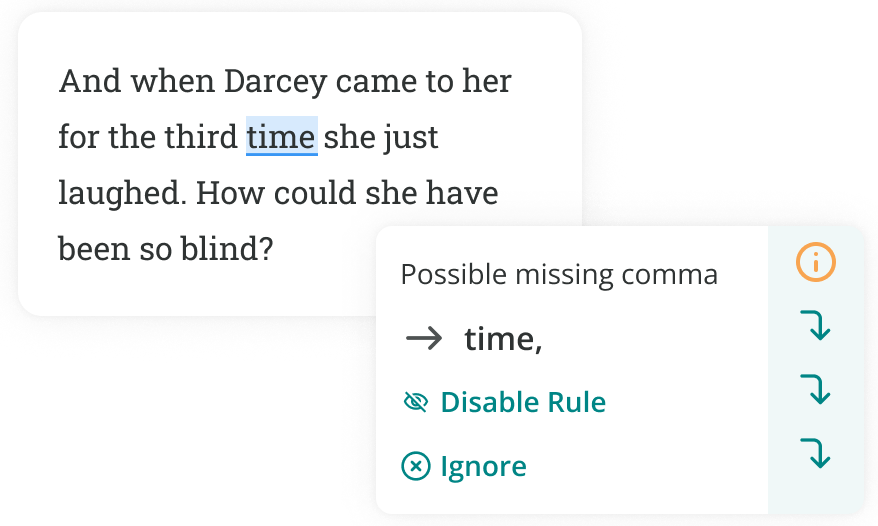
If you’re thinking about writing a book, you might want to know what kind of timeline you should expect.
If you’re anything like me, you might even feel impatient. It’s hard not to wonder when you’ll finally get to hold your completed manuscript in your hands.
So exactly how long does it take to write a book?
The short answer is: it depends! You need to consider a variety of factors, such as what genre you’re writing, how long you want your book to be, and how much writing time you give yourself each day.
This article will give you a full rundown on how long it takes to write a book, as well as our top tips for how to speed up the process.
How Long Does It Take to Write a Book or Novel?
When it comes to writing speed, there’s no one-size-fits-all answer. Jack Kerouac famously wrote On the Road in only twenty days. On the other hand, The Brief Wondrous Life of Oscar Wao took Junot Diaz ten years.
Talk to a dozen famous authors about their average writing time per book, and you’ll likely get a dozen different answers.
However, that doesn’t mean it’s impossible to make an educated guess about how long it might take you to write your own book.
Start by figuring out your target word count for your book. Then, figure out how many words you can sustainably write each day. You can divide your target word count by the number of words you write per day to come up with the writing time you’ll need to complete a first draft.

For example, say you’re writing an adult literary novel, and your target word count is 50,000 words. If you write 500 words a day, that means you’ll finish your first draft in about 100 days, which is just over three months.
Of course, this estimate just gets you to a first draft—it doesn’t account for the time you’ll need to revise your book afterward. I recommend doubling your first draft timeline (so, 200 total days using our previous example) to estimate how long it will take you to create a polished manuscript, since the revision process can sometimes take just as long as the drafting process.
How Long to Write a 100-Page Book
100 pages is about 30,000 words. To figure out how long it will take you to write a book of that length, you need to know how many words you write in a day.
If you commit to writing 1,000 words a day, you can finish a 100-page book in a single writing month.
If you write 250–500 words today, which is a much more sustainable pace for most writers, you can expect to finish a 100-page book in 2–4 months.
How Long to Write a Textbook
Academic textbooks vary widely in word count, depending on what field you’re writing in and what type of audience you’re writing for. An arithmetic textbook designed for elementary school students, for example, will be much shorter than a calculus textbook designed for college students.
Regardless of what kind of textbook you’re writing, you can still use the calculations we discussed above. Start with your target word count, and work from there.
If you’re writing a textbook, you may already be under contract with a publisher, who has most likely set a deadline for you. You can use that deadline as your target timeline.
How Long to Write a Chapter
Some writers like to plan one chapter at a time, rather than setting deadlines for the whole book.
Most chapters are around 1,000–5,000 words long. That means that if you write 500 words a day, a single chapter should take you anywhere from 2–10 days to complete.
Of course, some chapters can be trickier to write than others. You don’t have to set the same timeline for every chapter. If there’s one chapter that requires extra research or more planning, set aside some extra time to focus on that one.
7 Tips on How to Write a Book Without Taking So Long
There are many actionable steps you can take to speed up the book writing process, especially if you’re on a deadline.
Here are some of our top seven tips for finishing a book quickly.

Tip 1: Set a Deadline
Many people say, “I’m going to write a book,” and then never get around to doing it.
Setting a deadline is the first step to holding yourself accountable. Once you have a date circled on your calendar, that makes your commitment feel more concrete.
Tip 2: Establish Daily Goals
Writing an entire book can be a daunting task. Establishing small, bite-sized goals to reach every day can help make the bigger goal feel more manageable.
Some authors prefer word count goals, such as writing 500 words a day. Others prefer to set time goals, such as finishing at least one 30-minute writing session a day.
Word count goals are very popular, but a time goal might work better for you if you like to edit as you go, or if progress doesn’t always move in a straight line for you. That way, cutting words can count as progress too, since it’s also a step toward the final product.
Tip 3: Focus on One Task at a Time
There are many types of tasks involved in writing a book. Your writing process might consist of any combination of the following tasks:
- Brainstorming
- Research
- Outlining
- Writing
- Editing
Knowing what these tasks are and tackling them one at a time, rather than letting one task distract you from another, can significantly boost the speed with which you accomplish them.
There’s nothing more counterproductive than stopping to look up a fact or figure right when you’re in the middle of drafting a chapter. It’s much better to jot down the question you need to research and then plan to do it later, so you can focus on the task you’re working on.
Another example of multitasking is editing as you draft. Personally, I love revising each paragraph as soon as it’s down on paper—it’s part of my personal writing process—so I do it anyway, but it definitely slows me down.
Ultimately, you need to decide for yourself what parts of your writing process you’re willing to sacrifice in the name of speed. If you need to hit a deadline, then it’s usually better to focus on one thing at a time.
Tip 4: Keep Your Story Organized
Using an outline is one of the most efficient ways to write a book.
If you’re a fiction writer, outlining means you’ll already know what’s going to happen next in the story, allowing you to focus on getting words on the page. If you’re a nonfiction writer, outlining helps you plan out your logic and structure your research.
Not all writers like to use an outline. If you’re a “pantser,” meaning you prefer to write by the seat of your pants, you don’t necessarily have to outline beforehand. Still, you need some way of keeping your story organized.
One method I recommend for pantsers is to outline while you draft. Each time you write a new chapter, jot down a quick summary for yourself. This method can help you quickly pick up where you left off and see the whole story at a glance.
Tip 5: Use Placeholders
Placeholders can be crucial for fast drafting. Whenever there’s a question you don’t know the answer to that’s blocking you from moving forward with your book, put in a placeholder and come back to it later.
Let’s say you’re writing an epic fantasy novel, and you can’t figure out the blocking for a specific battle scene. Instead of putting the book on hold until you can decide on the best option, just write a placeholder, like “[insert battle scene here],” so you can move on to the next chapter.
The key is to keep moving forward. As long as you’re making forward progress, you can always come back and fill in the gaps later.
Tip 6: Try Writing Sprints
Many writers find writing sprints helpful for getting words down on the page.
Set a timer for a certain amount of time. Then write as fast as you can until the timer goes off. When it does, set another timer for a short break, where you can walk around, check social media, eat a snack, or anything else you want to do to relax and unwind.
Sprints are helpful because when you have the whole day to write, or a long chunk of free time, it’s easy to get distracted or check social media. But when you know you only need to sprint for a few minutes longer before you’re allowed to take a break, it’s easier to stay focused on writing.
For me, half an hour of actual writing followed by a 10-minute break tends to be my sweet spot. If the sprint is too much longer, I get bored in the middle and start to lose focus. If it’s much shorter, I can’t get into the flow of the story.
You can try different sprint lengths to figure out what works best for your writing routine.
Tip 7: Get Others Involved
A great way to make sure you hit your deadlines is by working with other writers. Ask a friend if they’re willing to be your accountability partner.
There are several ways you can work with a writing partner, so you can choose whichever method works best for you.
Here are some options to try:
- Check in with each other the day before a big deadline
- Send each other motivational messages
- Do writing sessions or writing sprints together
- Share a calendar and write in word count milestones together
- Send chapters to each other as soon as they’re done
How Long Does It Take to Publish a Book?
Traditional publishing can take a long time, depending on the size of the specific publisher you sign with and how long their publishing process takes.
On average, it takes anywhere from nine months to two years between the day you sign your contract and the day your book actually gets released. So once you’ve signed your contract, it’s time to buckle in for a long ride before you see your book on shelves.
How Long Does It Take to Self-Publish a Book?
Self-published authors get to set their own timelines. It can take as much or as little time as you want.
Finishing your book and clicking “Publish” on a self-publishing platform can happen within a single day. Of course, you probably don’t want to rush it if you want a professional product.
Take the time to do all the steps that a traditional publisher would do for your manuscript, such as developmental editing, copyediting, proofreading, and formatting. You can run your work through ProWritingAid to make sure you haven’t missed any spelling and grammar errors.

Conclusion on How Long Does It Take to Write a Book?
There you have it—our full guide to how long it takes to write a book and what you can do to speed up your own timeline. If you follow our tips, you’ll be well on your way to completing your manuscript.
At the end of the day, though, it’s important to remember that creating a book isn’t all about speed. Writing is an art form, not a race. Some of the most classic works of English literature took many years to write.
You shouldn’t rush to compete with Jack Kerouac, or with any other writers, for that matter. Taking your time and letting your book percolate for a while can help you create a better product in the long run.
So give yourself the time your book needs—your future readers will thank you for it!

